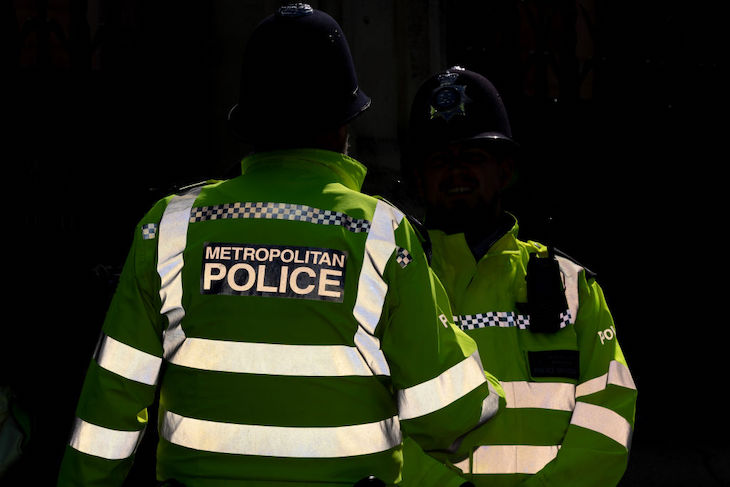Poundbury in Dorset looked beautiful as it prepared for the King’s arrival. Gardeners were sprucing up flowers; painters were hurrying their ladders into vans; security officers and policemen were positioned on every street corner. But my encounter with the men tasked with keeping us safe left me feeling deeply uncomfortable.
I was there with my 12-year-old daughter and mother and we took up a prime position outside the Monart Spa, where the King was to unveil a plaque. My daughter clutched a bunch of flowers so tightly that it lost most of its petals.
As His Majesty greeted the crowds, police officers made their way along the queues of people, straight-faced and eagle-eyed. I felt someone standing directly behind me. I turned. It was a dark-haired, casually-dressed man who clearly wasn’t there to greet the King. He was standing back, scanning the crowd. I noticed that he was wearing an earpiece and realised that he must have been part of the security detail. He caught my eye and I felt uncomfortable. I turned away.
One officer replied, ‘it’s not because you look dodgy. It’s because you’re hot.’
As I pushed forward to greet His Majesty, I felt the man’s presence come closer. But soon my mind was on other things. My daughter was one of the only children present and King Charles picked us out for a chat, even granting royal permission for her to take the rest of the day off school.
After the conversation, His Majesty walked off to open a garden in memory of his late father, the Duke of Edinburgh. We followed, along with the rest of the crowd, and came to a stop beside the garden. My daughter began doing cartwheels on a patch of grass behind me, so I kept an eye on her, turning frequently away from the King. That was when I saw that the man with the earpiece was still behind me.
As I turned back towards His Majesty again, I noticed another three men in plainclothes and earpieces in front. At least one of them seemed to be armed. They were talking amongst themselves and glancing regularly in my direction.
Behind me, the man was still watching me closely and he had been joined by a comrade. I was starting to feel unnerved. Worried that I was appearing suspicious, I said to them: ‘I promise you, I’m not dodgy. I’m just keeping an eye on my daughter who’s decided that doing cartwheels is more exciting at this point.’ They laughed and one replied, ‘it’s not because you look dodgy. It’s because you’re hot.’
Taken off-guard, I felt myself flush. Nervously, I said: ‘I’d rather I was on Dorset’s most wanted list, as I am spoken for,’ and flashed my engagement ring. He didn’t move. My mother touched my arm and said, ‘are you OK?’ By this time, I was sandwiched by the security men, with two officers behind and their three comrades in front.
One of them tried to strike up a conversation. ‘Are you local?’ he asked. I said that I wasn’t, and tried to close down the exchange. Then I called my daughter and suggested to my mother that we leave the King to it and find some lunch. The men didn’t try to follow me as I walked away. But their eyes did.
Wayne Couzens, who murdered Sarah Everard in 2021, and the serial rapist David Carrick, were both members of the same Metropolitan Police armed unit. Carrick used his gun as a symbol of sexual power and intimidation. During his criminal trial, the Old Bailey heard that Carrick held his police firearm to the head of a woman as he violently raped her.
Couzens was a member of a WhatsApp group with police colleagues, where misogynist, sexist and degrading messages were shared. One post used the term ‘struggle snuggles’ to describe pinning a 15-year-old girl to the floor during an incident.
In another post, a policemen joked about performing a sex act on a victim of domestic violence. ‘That’s alright, DV (domestic violence) victims love it… that’s why they are repeat victims more often than not,’ the officer wrote. Hundreds of serving officers are under investigation for domestic and sexual violence.
Having been a victim of abuse in the past, I am aware that I carry with me a sense of wariness around men. But I have also developed finely-tuned instincts for danger. The way these plainclothed officers behaved was not normal.
Those officers had not broken the law, of course, and I would have felt silly lodging an official complaint. But there had been something unsettling and predatory about them. It worried me.
What would have happened if I had been local, and had told them where I lived? What would have happened if it was not a Royal visit but some other event, taking place after dark? What would have happened if I had been alone? Or drunk?
It is now common knowledge that the police, which is supposed to protect us, has squandered public trust by failing to root out the letches, misogynists and criminals in its own ranks. But now I know this in my gut. My experience in Poundbury left me with the disturbing knowledge that in 2023, women in Britain are less protected than preyed upon by the police.
A Met Police spokesman said: ‘We take allegations of this nature seriously and we would welcome the opportunity to speak to the woman involved in this incident, should she wish to. It is clear that this kind of behaviour is inappropriate and unprofessional.’






Comments